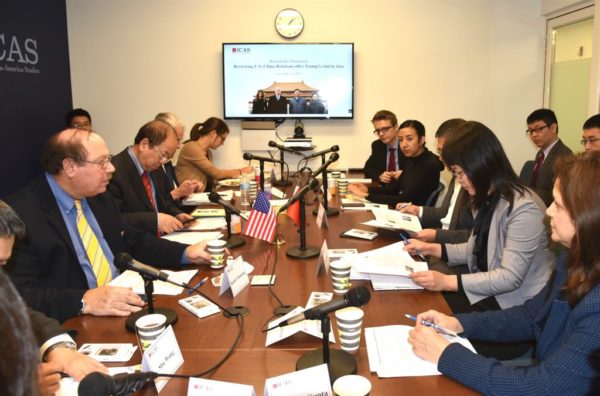
An on-the-record roundtable discussion of President Donald Trump’s visit to China, and the Asia-Pacific, was held at the office of the Institute for China-America Studies (ICAS) on 16 November 2017. The discussion involved a mix of American and Chinese participants as well as a mix of seasoned academic and policy practitioners as well as young and up-and-coming scholars. The discussion was chaired by Yawei Liu, director of the China Center at the Carter Center, in his capacity as an advisory board member of ICAS. Following is a summary of the roundtable discussion that was conducted. The summary is divided thematically, even though the discussion was a free-flowing one and seamlessly glided across topics over the course of two hours.
U.S.-China Relations under Trump and Xi
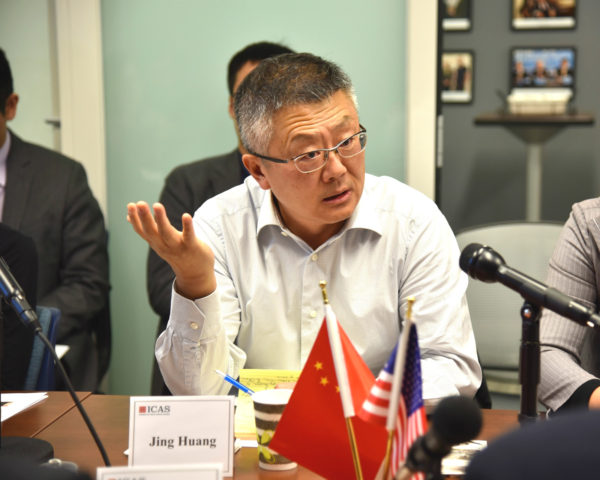 Some participants held that Donald Trump’s visit to China had turned out to be a victory for Chinese foreign policy and a loss for the United States. As Prof. Jing Huang from Robert Bosch Academy, pointed out, this was the first time in the post-WWII order that an American president was treated as a guest, rather than a regional partner, during an Asia trip. Although he was treated like a king, he was as a visiting king, and his lavish pampering appeared to distract from securing any tangible policy outcomes. Others concurred on this point, noting that China after an initial period of uncertainty had gotten a handle on how to manage and deal with Donald Trump. There were dissenting voices to this viewpoint though. They cautioned that it would be naive for China to believe that this was indeed the case. Trump is consistent in his vanity and preference for tension and chaos, and this by definition makes him unpredictable.
Some participants held that Donald Trump’s visit to China had turned out to be a victory for Chinese foreign policy and a loss for the United States. As Prof. Jing Huang from Robert Bosch Academy, pointed out, this was the first time in the post-WWII order that an American president was treated as a guest, rather than a regional partner, during an Asia trip. Although he was treated like a king, he was as a visiting king, and his lavish pampering appeared to distract from securing any tangible policy outcomes. Others concurred on this point, noting that China after an initial period of uncertainty had gotten a handle on how to manage and deal with Donald Trump. There were dissenting voices to this viewpoint though. They cautioned that it would be naive for China to believe that this was indeed the case. Trump is consistent in his vanity and preference for tension and chaos, and this by definition makes him unpredictable.
On U.S. economic ties, there were mixed views but by-and-large a good deal of agreement that bilateral ties were headed for a period of tension ahead. There was criticism that the U.S. had not pushed China hard enough during the current trip on sensitive market access issues but had been satisfied with significant commercial deals in principle. This was a serious error and a win for the Chinese side. There was also criticism of China’s indifferent pace of structural economic reform. China has been the number one beneficiary of the rules-based global economic order and restrictions on domestic market access was a short-term strategy that would, at the end of the day, turn out to be self-defeating for China.
Participants questioned whether the 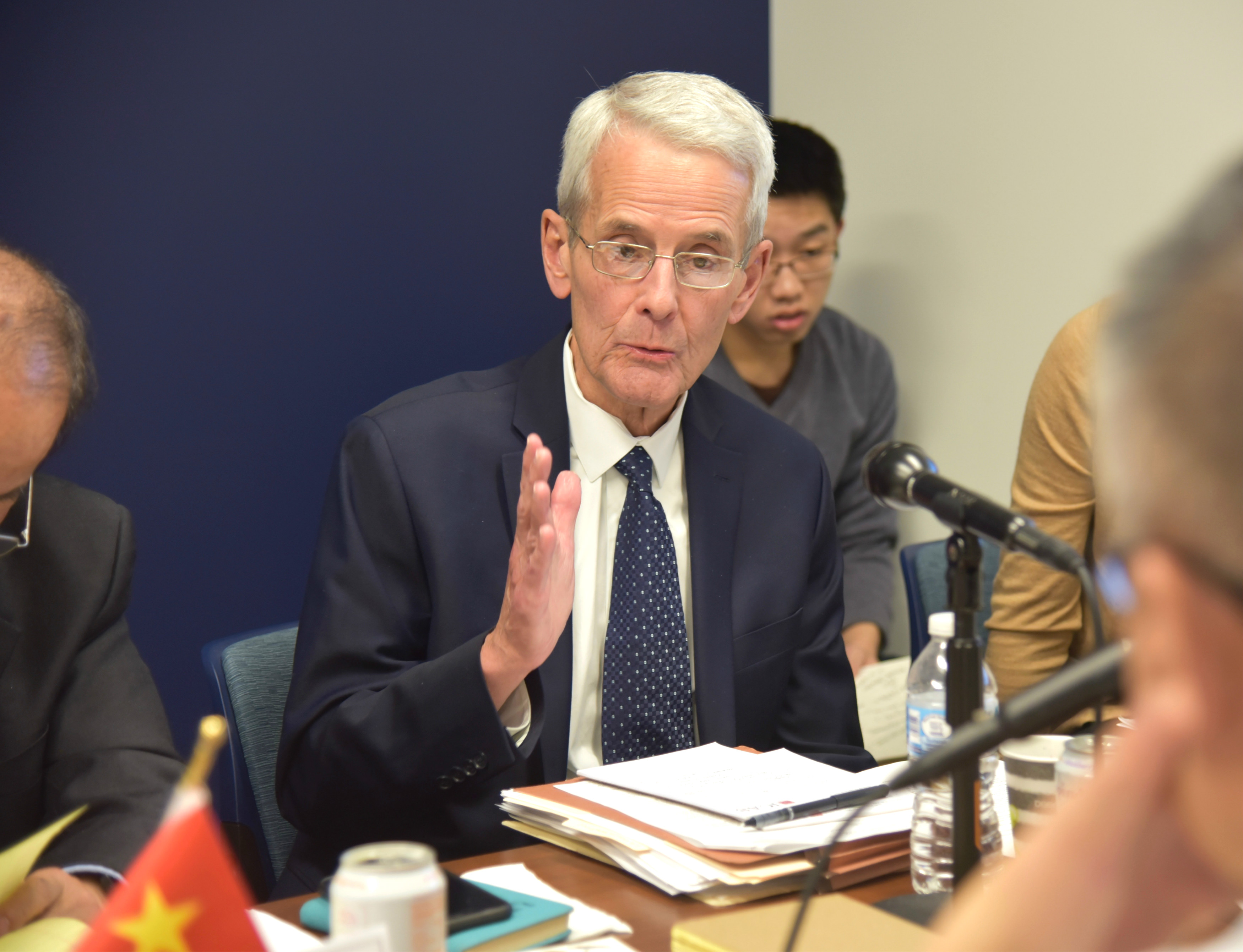 U.S.-China relationship lacks an overarching framework. Prof. Robert Sutter from George Washington University pointed out, this lack of an overarching framework has existed since the end of the Cold War. Xi Jinping’s espousal of a new framework of U.S.-China relations and international relations will not find buy-in at the U.S. end. On a more positive note, some argued that bilateral cooperation on resolving the North Korean issue might be able to provide the basis for developing a new framework for long-term cooperation between the United States and China. Others disagreed however. Where there was consensus though was that the global order was trending from a unipolar one to a multipolar one and that it was important to institutionalize and steer the bilateral relationship onto a more stable track.
U.S.-China relationship lacks an overarching framework. Prof. Robert Sutter from George Washington University pointed out, this lack of an overarching framework has existed since the end of the Cold War. Xi Jinping’s espousal of a new framework of U.S.-China relations and international relations will not find buy-in at the U.S. end. On a more positive note, some argued that bilateral cooperation on resolving the North Korean issue might be able to provide the basis for developing a new framework for long-term cooperation between the United States and China. Others disagreed however. Where there was consensus though was that the global order was trending from a unipolar one to a multipolar one and that it was important to institutionalize and steer the bilateral relationship onto a more stable track.
The North Korean Nuclear Crisis
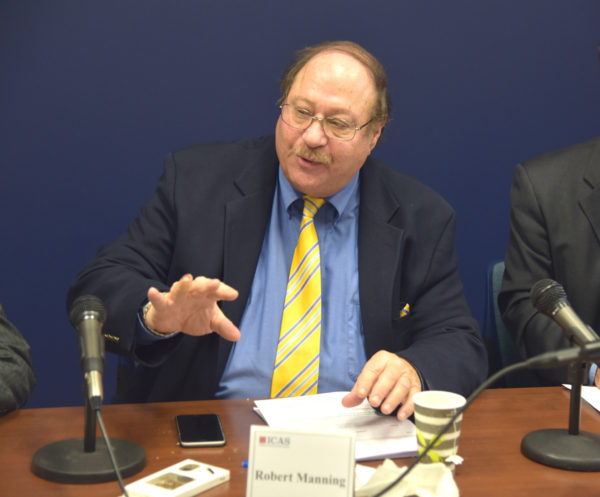
There was a broad consensus that the Korean Peninsula nuclear crisis affects international security, regional stability, and relations between the major powers. There was also a consensus amongst participants that the trip was a missed opportunity to seriously grapple with this tense and difficult issue. Though Trump did put out a consistent message to his Asian counterparts to isolate the regime in Pyongyang and, by-and-large, remained on message during the first part of his trip, he also undermined that message with his provocative tweets on the subject during the latter part of his Asia tour. There was a feeling among participants that Trump’s Asian counterparts were no wiser off at the end of the trip what exact plans Donald Trump has in mind to manage, resolve or mitigate the crisis on the peninsula. Worse, participants expressed fear that the Trump Administration hadn’t fully grappled with the human and material costs of a preventive strike on the regime or its nuclear assets. As Robert Manning from the Atlantic Council noted, there is great uncertainty as to where the DPRK’s nuclear assets are stored and a preventive strike would at best eliminate a fraction of that capability. Pyongyang’s reprisals thereafter and the outbreak of war could lead to massive casualties.
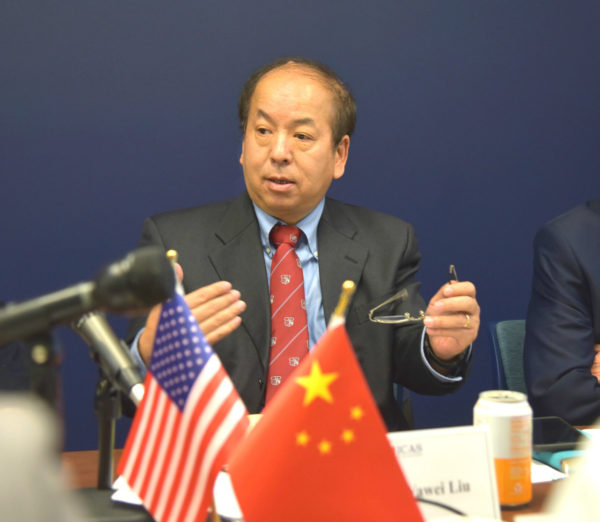 Speakers also concurred that America’s willingness to discuss preventive war with North Korea as a means to denuclearize the Korean peninsula puts China in a difficult position. Some speakers stressed that the fundamental interests of the U.S. and China are not aligned on this issue. While the U.S. is happy to squeeze the regime with military threats and sanctions to the point of collapse, this would be a disaster for China. The only thing worse than a nuclear North Korea is a collapsed and chaotic North Korea. As such, one of the participants commented that China could live with the collapse of the North Korean regime but not the collapse of the North Korean state per se.
Speakers also concurred that America’s willingness to discuss preventive war with North Korea as a means to denuclearize the Korean peninsula puts China in a difficult position. Some speakers stressed that the fundamental interests of the U.S. and China are not aligned on this issue. While the U.S. is happy to squeeze the regime with military threats and sanctions to the point of collapse, this would be a disaster for China. The only thing worse than a nuclear North Korea is a collapsed and chaotic North Korea. As such, one of the participants commented that China could live with the collapse of the North Korean regime but not the collapse of the North Korean state per se.
Some Chinese participants held out hope that the Korean Peninsula crisis could be managed and resolved on terms short of war. They stressed that China remains committed to a denuclearized Korean Peninsula and the suspension-for-suspension proposal that the Chinese government has floated could be a starting point to reduce tensions. There is still time for dialogue to resolve the crisis. Others though were pessimistic that North Korea could be constructively engaged at the dialogue table. Overall, at a minimum, Trump’s trip to Asia did not present any positive contributions to resolving the crisis.
U.S. Economic Engagement in the Asia Pacific
Donald Trump’s “America First” economic policy, which he promoted throughout his trip to the Asia-Pacific, was uniformly deemed to be the greatest failing of the trip.  There was a wide consensus that American leadership in Asia and its broader interests in the Asia-Pacific region will suffer lasting damage because of his mercantilist policy stance. Such policies are simply incompatible with the trend of globalization, which is market-driven and not possible to arrest. Participants cautioned however that China should not see this as a victory. If America recedes economically from the Asia-Pacific economic stage, the increased anxiety will drive other regional states to cooperate much more closely with each other – just like France and England did to counter Germany’s rise in Europe during the first half of the 20th century. Already, Japan has taken the lead in negotiating the TPP-11 and other countries too will fill the vacuum. At the end of the day, it will be the U.S., which will suffer the greatest damage as it is out-competed in many of these dynamic Asian markets.
There was a wide consensus that American leadership in Asia and its broader interests in the Asia-Pacific region will suffer lasting damage because of his mercantilist policy stance. Such policies are simply incompatible with the trend of globalization, which is market-driven and not possible to arrest. Participants cautioned however that China should not see this as a victory. If America recedes economically from the Asia-Pacific economic stage, the increased anxiety will drive other regional states to cooperate much more closely with each other – just like France and England did to counter Germany’s rise in Europe during the first half of the 20th century. Already, Japan has taken the lead in negotiating the TPP-11 and other countries too will fill the vacuum. At the end of the day, it will be the U.S., which will suffer the greatest damage as it is out-competed in many of these dynamic Asian markets.
For their part, some of the Chinese participants noted that China’s engagement with the U.S. is likely to receive a positive boost in light of the outcomes of 19th CPC National Congress. At the Congress, President Xi reiterated his intention to promote economic and structural reforms and further open the Chinese economy to global market forces, which he sees as the path for China to attain prosperity and achieve its ambitions. This market-opening holds out a useful opportunity to further deepen U.S.-China ties and address the criticisms directed against China by the U.S. business sector – hitherto China’s most vocal backer – that the economic playing field is tilted in favor of domestic competitors at the expense of U.S. businesses operating in China.
The Trump Administration and the South China Sea
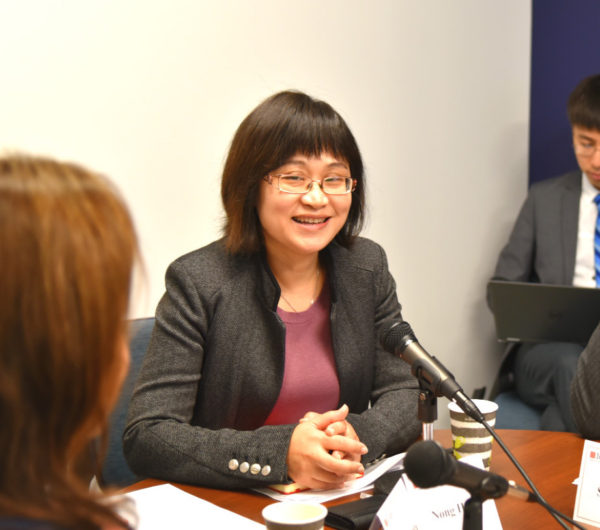 Chinese participants made two important points with regard to the Trump visit and the South China Sea issue. First, they noted how little of the visit’s focus was dominated by this issue.
Chinese participants made two important points with regard to the Trump visit and the South China Sea issue. First, they noted how little of the visit’s focus was dominated by this issue.
Though President Xi had mentioned China’s land reclamation activities in the South China Sea in his 19th Party Congress report as a domestic issue that didn’t pertain to external actors, President Trump did not offer any pushback. Second, they noted how the South China Sea issue has to a certain extent faded from the regional headlines and this they felt provided a useful opening for China to maintain and strengthen relationships and strategic stability in the South China Sea region. They alluded to the fact that between 2012 to mid-2016, Asia-Pacific policy-makers were overly absorbed with the South China Sea situation and now, en masse, they have pivoted their attention towards the Korean peninsula issue.
There was broad consensus among participants that the South China Sea issue was no longer the driving issue in U.S.-China relations that it had been during the first half of this decade. It is becoming a back-burner issue. Some wondered though if Trump’s unpredictable comments, such as his offer to mediate these disputes, had unnerved allies who look for a strong show of commitment from the American president to defend their interests as well as international law.
Outcomes from the 19th National Congress
 National rejuvenation, building China into a great, modern socialist country, and realizing the ‘China Dream’ were signature themes that were reiterated at the 19th National Congress. For the Chinese participants, this was also understood to mean that China seeks an enabling and peaceful international environment to realize its economic and social aspirations. China does not seek to overturn the international order but, to the contrary, defend and improve the existing system so that its peaceful development can be realized. Growth, development and the well-being of the Chinese people will continue to remain the overwhelming focus of the Chinese government and is linked to the greater well-being of the world at large. As the world’s second-largest economy, China needs a predictable and stable strategic environment and has therefore proposed a new system of “major country’s diplomacy with Chinese characteristics” so that outdated zero-sum hegemonic competitive mentalities can be abandoned.
National rejuvenation, building China into a great, modern socialist country, and realizing the ‘China Dream’ were signature themes that were reiterated at the 19th National Congress. For the Chinese participants, this was also understood to mean that China seeks an enabling and peaceful international environment to realize its economic and social aspirations. China does not seek to overturn the international order but, to the contrary, defend and improve the existing system so that its peaceful development can be realized. Growth, development and the well-being of the Chinese people will continue to remain the overwhelming focus of the Chinese government and is linked to the greater well-being of the world at large. As the world’s second-largest economy, China needs a predictable and stable strategic environment and has therefore proposed a new system of “major country’s diplomacy with Chinese characteristics” so that outdated zero-sum hegemonic competitive mentalities can be abandoned.
Other participants, however, did not read such a benign message and instead pointed to contradictions in China’s rhetoric at the 19th Party Congress. Although Xi’s speech focused on unity and the common good for all mankind, he did so in a manner that was self-absorbed. Seventy percent of China’s diplomatic activities is directed to its neighbors, yet none of the rhetoric at the National Congress was directed at addressing their concerns. Instead, “it was all about China.” China needs to communicate in a language that is more easily accessible and more easily embraced by its neighbors and peers – otherwise, the communication will continue to remain one-sided and fruitless.
Summary
There was a broad consensus that the China-US relationship is one of the most – if not the most -important bilateral relationships in the world today. As such, Donald Trump’s first trip to Asia was of great importance and was therefore parsed in great detail. The lasting impression of the trip among the participants – albeit mostly on the American side, was that Donald Trump had (predictably) underperformed and that he had failed to uphold the U.S. enduring interests in the region. To that extent, China was the big winner coming out of this trip. The U.S. thinks that the DPRK issue was the most pressing geopolitical issue in the Asia-Pacific, while Asia Pacific countries have not reached a consensus on this. Trump’s inconsistent delivery on this issue in Asia did not leave his counterparts any clearer regarding his thinking on how to resolve the issue, and in fact set back the chances for a successful resolution. Overall, Trump’s trip to Asia and his Administration’s new policy towards Asia, including his ‘America First’ economic approach, has deepened rather than lessened U.S. allies and partners concerns’ about America’s staying power and commitment to the region.